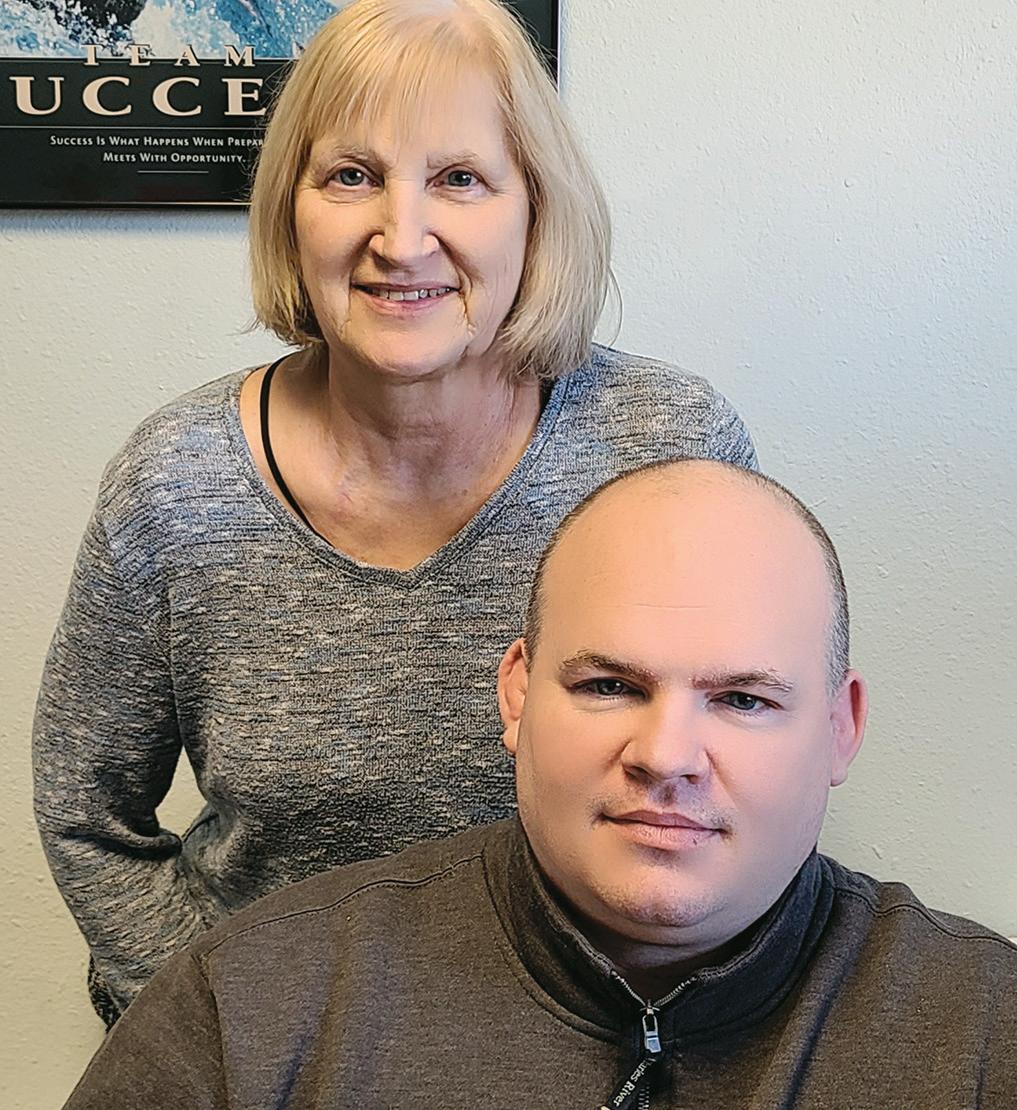



































The Elkhorn YouthBuild and Habitat for Humanity of Walworth County recently opened up the doors to one of its recent builds in Whitewater for an open house on Sept. 15 celebrating not only the project itself, but the future partnership of the two entities.
By Kellen Olshefski CORRESPONDENTCareer and College Academy Director of School to Work Opportunities Chris Trottier said that after the YouthBuild program finished its first home in August of last year, they needed to apply for another grant, a part of which included identifying a partner that would basically serve as the supply and construction part of the home.
The YouthBuild grant comes directly from the Department of Labor, and Trottier said it’s really designed to use the construction of a home as a conduit to developing employability skills, workforce readiness, life skills and academic and content skills.
While the program had previously partnered with Community Action of Rock and Walworth County, Trottier said the two mutually agreed to part ways after the completion of the last grant, as not only was Community Action taking on a bit of a remodel of its program, but the CCA was also looking at how to both sustain and scale the YouthBuild program.
With that in mind, Trottier reached out to Habitat for Humanity of Walworth County.
According to Trottier, this was a very new idea for Habitat for Humanity, as the organization’s model is designed around weekend volunteerism.
“We were very adamant that they weren’t going to lose any of that,” Trottier said. “What you are going to gain is, Tuesday through Friday, you’ll have a group of kids learning and building under your purview with a construction manager, and also not only cleaning up and getting the job site ready for the week from the previous build, but also getting it ready for your next weekend of volunteerism.”
Trottier said that with the idea being so new to the organization, he had several conversations with the organization, meeting with its executive board and even joining its construction board.
“We started preparing for the next house, and we were fortunate enough to be a recipient of a YouthBuild grant in May,” Trottier said, noting the Elkhorn program was one of only two school districts in the country and one of two sites in Wisconsin to receive the grant, totaling about $824,000.
Under the new partnership, Elkhorn YouthBuild has been building the new home in Whitewater and invited local press and community leaders to an open house on Sept. 15.
The hope is that they’ll be able to see a family move into the home within just the next few months, meaning students will have gotten to see the project from beginning to end.
While it’s only the partnership’s “maiden voyage,” Trottier said that so long as all parties’ resources and visions align, both see it as a quality and sustainable partnership moving forward.
Of course, Trottier said there’s always outliers there, such as Habitat needing to
obtain funding for future builds, viable applicants for homes and building lots.
But, he said the school district and Habitat have been living in similar spaces, looking to ensure that they can collaborate and strategically be successful together.
“We’re both meeting with the right community members,” he said.
For example, he noted they’ve both met with the Walworth County Housing Authority and discussed how that organization could fit into the equation, with the authority’s executive director, Sarah Boss, even writing a letter of endorsement for the program.
Trottier also noted the upcoming Walworth County Housing Summit, hosted by Walworth County Economic Development Alliance Executive Director Derek D’Auria, will also feature a presentation on the YouthBuild program during the program’s solutions segment.
“It’s obviously not the only solution, but it definitely contributes to some of the housing challenges that communities are facing right now,” he said.
Ultimately, Trottier said he thinks it’d be a wonderful opportunity if both organizations could get to a point where they’re both building more.
“It’s just a matter of identifying the resources and the support to be able to get that level of sustainability happening,” he said.
“I think the conversations are right, the energy’s right and the commitment’s right,” he added.
Trottier said this was one of the nice things about the Sept. 15 open house, as it offered students an opportunity to share their excitement and experience knowledgeably with the adults in attendance, including members of the Habitat for Humanity of Walworth County board.
“Everybody really appreciated that opportunity to celebrate the kids and the relationship together,” he said.
Under the program, which is funded by a federal grant, students receive 6 months of on-the-build skills and construction training.
During that time, Trottier said students have to acquire industry-recognized certifications, such as AED, CPR and OSHA certifications.
In addition, Trottier said CCA also just developed a partnership with Associated Builders and Contractors of Wisconsin, meaning students will also get a national construction certification known as the NCCER.
“So, our kids are going to walk around with additional certifications, they’re going to get hands-on job experience, we’re taking them through some pretty intensive employability skills training, using a national curriculum, and then we’re doing a lot of workforce development,” he said.
Following those initial 6 months, Trottier said students then work directly with him over the course of the following year, during which they have to maintain employment and Trottier provides them with coaching and guidance.
As it’s funded by a Department of Labor grant, Trottier said the ultimate goal is to ensure that these students are in the workforce following the program and have the skills to not only identify a job, but sustain and excel in that job as well.
“We cover financial literacy, we do mock interviews, resume and cover letter development, so a lot of really foundational workforce development skills for 16, 17 and 18-year-old kids,” he said.
What’s more is that Trottier said Elkhorn’s program has proven successful among students, with students from the previous build reaching out to him on occasion, for instance when thinking about seeking out a new job.
“Just having the skills to be nimble enough to seek better employment and feel comfortable applying and interviewing has been really rewarding and great for kids,
and great for our community,” he said. Trottier said an exciting aspect for the program has been seeing people gravitate towards the experience with an interest in being a part of it, as the program continues to share its progress through various avenues, like social media and local news.
For instance, he said it’s been great to see local organizations and businesses like the Elkhorn Area Chamber of Commerce, Elkhorn Rotary, Stebnitz Builders, Southern Lakes Heating and Plumbing, Precision Plus and Adams Power show their support. They have not only brought on students as Department of Workforce apprentices after the build, but opening their doors to teaching students about what it means to be a quality employee, employability skills, job readiness and succeed on a team.
“They’ve been awesome partners,” he said.
Trottier said it’s really about creating a different experience for kids.
“They’ll look at it and say this is almost truly relevant to me, and I think that’s what is truly important about this,” he said. “Plus, the kids are getting out and they’re on a job, and they’re getting paid.”
Trottier noted the exciting thing about career pathways for kids being exploratory, experiential and project-based is that it allows them to figure out what they want to do... and what they don’t want to do.
“After that, they can choose their path,” he said. “There’s nothing wrong with a kid who wants to be a doctor, who then also wants to go become a CNA and work on a medical floor to truly understand what the entire healthcare experience is like.
“Creating those opportunities for a student who wants to go into healthcare, similarly to a student who wants to go into the building trades, manufacturing or accounting, where they’re truly gaining that real world experience. I think that’s just priceless … it’s just the power of the experience,” he added.
A publication of Southern Lakes Newspapers LLC and The Beacon 1102 Ann St., Delavan, WI 53115 (262) 728-3411
GENERAL MANAGER: Sue Z. Lange
EDITOR IN CHIEF: Heather Ruenz
CREATIVE DIRECTOR: Heidi Schulz
PAGE DESIGNER : Jen DeGroot
ADVERTISING DIRECTOR: Vicki Vanderwerff
On the cover: Tanner Berge stands beside his No. 35 Berge Racing 602 late model at Dells Raceway Park on Sept. 2. Tanner set fast time at the raceway that night and found his way into victory lane. Read about Tanner and his brother’s recent success, as well as the entire family’s love for racing on page 7.
Walworth
PPam and Ben Patterson never set out to run a non-profit in service of foster children, but Walworth’s Agape House, and the meaning of the word itself – agape is a Greek word for the unconditional love of God – has been a quiet echo that’s stretched the length of their whole lives together.
Pam went to college to work with abused children and families as a counselor, but she said, “The Lord had other plans.”
She married Ben two weeks after her college graduation, and a year into their marriage with a newborn baby in her arms, the plan she’d had for her life evolved into something she could never have dreamed up for herself.
Ben’s sister reached out to the newlyweds for help. She had an abusive husband and four children she could no longer take care of on her own. Following their faith in God’s plan for their lives and the love they had for their family, they said yes and instantly became a family of seven.

A year later, after the birth of their second biological child, Ben Patterson was offered a job in Wisconsin. In order to move from Illinois with the four children they had under relative guardianship they had to become licensed foster parents. Only married at that point for two and a half years, they became foster parents without a second thought, with no ambition to bring more children into their home.
One night soon after, well past their children’s bedtime, they got another call they weren’t expecting – two boys needed emergency short term placement, they were told six months tops. The Pattersons looked at one another, again said yes, and brought the boys home.
Just before the end of the six months Ben was out driving and said he heard the quiet whisper of the Lord speaking to him saying, “What you do unto the least of these you do unto me.”
He went home and spoke to Pam and they called the county and told them that the boys could stay until it was time for their reunification, when they would be able to go home.
Over the next 10 years the family continued to welcome almost 100 foster children in their lives.
“We’re people of faith,” Pam said. “We live for the Lord and His will and sometimes trusting Him means stepping out in that faith when we can’t see where He’s leading us.”
When their two biological children were in school full time and their four original foster children were out in the world thriving, Pam found herself praying again about where the Lord wanted her to go.
With thoughts of returning to school to get her masters and eventually opening the counseling practice she’d originally dreamed of she heard God speak to her very clearly, “just as I heard the cries of the Israelites and I called Moses, I heard the cries of my children and I’m calling you. I want you to start a Christian children’s home for hurting teens.”
Her husband was out of town that day
But when Ben called that night he said that as he was driving and praying he saw a vision of a bigger house and many kids
playing around it and he felt the Lord was saying that they needed to start a Christian children’s home. Pam started crying, and again they opened their hands in faith to what the Lord would ask them to do.
Two weeks later Pam was at a church
function and when a man walked up to her and said he knew she was going to be there and wanted to talk to her, Pam said it felt like God ordained. He was a lawyer and heard that one of their foster kids was in legal trouble. He said he felt led to represent him for free.
They got to talking and Pam told him about her vision for their children’s home so he said he’d help her with that, too, for free. Their non-profit was up and running within the next six months.
The Agape House slowly took form over the next 26 years, growing from a safe home for a few foster children, into a non-profit organization that offers mentoring, counseling, schooling, and support for children and their families, defying every odd that might have kept them from their mission.
It’s the only organization of its kind in Wisconsin – and one of only nine facilities nationwide – filling a niche that hasn’t previously been met, focusing on private placement children who haven’t been taken by the state but who have issues that their parents or guardians need help navigating.
“Kids can come live with us and give the parents some breathing room while they learn how to be the best for their children,” Pam said.
In 2007 they started looking to expand and add a school to Agape House because their children weren’t doing well in public or private schools. They saw that a huge part of the childrens’ healing was missing and wanted to begin to offer in house counseling, not only to the students but to their families as well. At that point they increased their services from being a residential program to being able to offer a community program, counseling, parent groups, and mentoring. They saw that academics needed to be secondary to the children’s emotional healing, because it was the reason many struggled with academics in the first place.
The faith-based ministry offers sliding fees, but one of Pam and Ben’s commitments to each other – and to the Lord – is that they will never turn a child away because of finances.
“We will take a child for nothing,” Pam said, adding that they help families throughout Wisconsin, Illinois, Minnesota and Michigan.
Agape House might have started with the Pattersons in their home all those years ago but the private placement residential treatment home now boasts a staff of 20 and has three buildings to support a teen home, a school, and a transitional living facility for older children who they’re helping to learn to navigate adult life.
The Pattersons’ goal is what it has always been, to serve the Lord with their lives.
With the Agape House they’re getting to the heart of the children and their families that find their way to their door and helping them navigate the challenges they’ve faced. They also give them tools to overcome and thrive by showing them love and compassion as a great testimony of God’s faithfulness.
For more information, visit agapahouseheals.org.

Autumn is a time to get out and enjoy the last of the pleasant weather as we move toward winter. October especially is when we notice the changing colors of the leaves and when many celebrate Halloween, a time when some look into the spirits and the deceased of the area.
Black Point Estate offers a variety of programs that provide history of the area and introduce guests to spirits, spiritualism, and a historic walk through one of Lake Geneva’s most picturesque rural cemeteries.
Oak Hill Cemetery was designed by Horace W.S. Cleveland, famous Midwest landscape designer. Take a walk through this beautiful cemetery and learn about the 19th century rural cemetery movement. Learn about some of the special Lake Geneva residents who are interred here.
This event – which will be offered Oct. 14, from 5 to 6:30 p.m., takes place outdoors and visitors will be walking through the cemetery so should dress for the weather and wear comfortable walking shoes.
Tickets are $18 and the cemetery is at 1101 Cemetery Rd., Lake Geneva.
Attend a special program held in the dining room of Black Point Estate. This event will focus on the spiritualism that was prominent in the Victorian Era.
Guests will learn about the famous Fox Sisters, often credited with creating the first major wave of Spiritualism in American as well as the Morris Pratt Institute, which was located in Whitewater and was the first school dedicated to teaching Spiritualism in America.
Following the program, guests will enjoy a Victorian era cordial.
Tickets are $75 and the program will be offered Oct. 13 and 20 from 7 to 8:30 p.m. at. Black Point Estate, W4270 Southland Rd., Lake Geneva.
Every place has stories of scandals and gossip that permeates the area and Lake Geneva is no exception. Learn about the historic gossip that included the 1950s bank robbery, the town’s tie to prohibition gangsters and tales of the Lake Geneva sea serpent.
The tour will meander through downtown and the historic Maple Park neighborhood and include its “sordid and scandalous” past. The walking tour and covers 1.3 miles in roughly 90 minutes and guests should dress for the weather along with wearing comfortable shoes.
Tickets at $15 and the group will gather at 812 Wrigley Dr., Lake Geneva. Tours will be held Oct. 14, and 21 from 11 a.m. to 12:30 p.m.
Tickets for any of these events listed above may be purchased at blackpointestate.org or by calling 262-248-1888.
On a recent weekend, Pioneer Cemetery in Lake Geneva had a very different look. This historical cemetery, the first in Lake Geneva, could be seen with men and women in clothing of the 1800s, representing some of those who had died in those days.
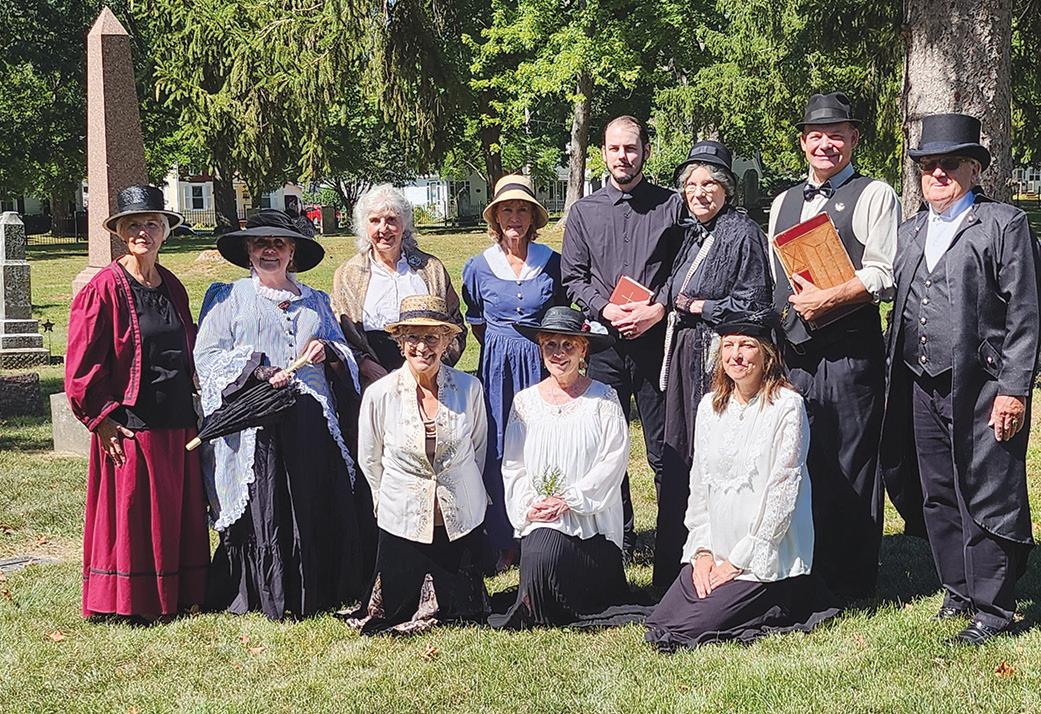
They are seen standing near their graves, giving the impression of having returned to life, ready to tell the stories of their lives, their spouse’s lives and some of the early history of Lake Geneva.
These people taking on the persona of long dead residents were volunteers for the program, presented by Black Point Estate.
“Each of the portrayers were given basic information about their character and then were expected to do the research to learn more and present a short history to those on the tour of the cemetery,” shared Chris Brookes, coordinator for Black Point Estate Speakers Bureau and presenter of one woman researched based shows based on history or literature. “They also had to create a costume appropriate for their character,” Brookes added.
This Pioneer Cemetery walk included a self-guided map that led to nine different grave sites with historic interpreters to share their stories.
The cmetery was created by seven men who were interested in creating public spaces necessary to create a city that would be enjoyed by all residents and would have the needed parks, churches, and schools, to encourage a good life.
Outside the cemetery there is a plaque
which reads: “Pioneer Cemetery The first cemetery in Lake Geneva. In 1837 seven men who were early landowners in section 36, gave land to the village for public purposes. They wanted areas for parks, churches, schools, & a cemetery.
Thomas McKaig was hired to survey the land. Streets were named after early settlers & you will recognize some of the names on the gravestones located here. Land donors were R. Wells Warren, Greenleaf Warren, Col. James Maxwell, Dr. Philip Maxwell, Andrew Ferguson, George Campbell, Lewis Goodsell.”
Upon entering the cemetery through the main gate there is another important sign – a list of the Civil War Veterans buried in Pioneer Cemetery. Many were the early settlers of Lake Geneva or their children.
The cemetery is a beautiful, peaceful place. Created in a perfect square, as it was surveyed by McKaig. It appears as a large park with beautiful large Oak, Maple, and Pine trees to add to the quiet peaceful look. It’s surrounded by four streets, Dodge, Maxwell, Warren and Park Row, some named after early residents who were responsible for the creation of it.
While most cemeteries are outside of towns, this cemetery is found in town with residential homes on all four streets around it. While not out of town, it was built on the fringes of the community and over the years the neighborhood encircled it.
While meandering through the cemetery the Saturday of the walk, soft music played by Cyndi Salata of the Lake Geneva Symphony. On Sunday’s walk, music was provided by the Country Gentlemen Barbershop Quartet.
Visitors on the walk were encouraged to bring a blanket and even a picnic lunch so they could sit down and enjoy themselves while listening to music and recalling the
stories they heard of the early residents by the portrayers.
At one time the cemetery was filled with headstones commemorating the deaths of the early settlers and Civil War Veterans whose bodies were returned home. Over the years, the headstones – many of which were created out of limestone and sandstone – crumbled. Thus, it is now difficult to find some of the graves.
Over the years, as the headstones crumbled, they were piled up in one corner of the cemetery. Many who grew up in the area and who may have enjoyed playing in the cemetery recall a very tall pile of broken stones. Then one day they were no longer there and it’s believed the city removed them.
For many years the cemetery gates remained locked to prevent damage being done there. Owned by the city, visitors had to request that the city unlock the gate so they could visit the graves. These requests were not always granted depending on the city’s ability to send someone to open the gate however, they did open it on holidays and special days of their choosing.
This year, Patrick Quinn, a historian and retired Northwestern University Archivist, moved back to Lake Geneva to the home where he grew up. It happens that the home of his childhood is located right across from Pioneer Cemetery. He became the Keeper of the Keys to the Cemetery and now when he’s in town and able to do so, he opens the cemetery every day for visitors to enjoy the history of the early settlers.
The walk through the cemetery and meeting the various “Early Settlers” presented a new understanding of life in Lake Geneva many years ago. Viewing
the settlers next to their graves offered a glimpse into the wealth of the individual settlers. The wealthier the family, the larger the family plot marker.
It was no surprise that the largest was that of Dr. Phillip Maxwell (Tom Yoder) and his wife, Mrs. Doctor Phillip Maxwell (JaNelle Powers). Although her first name was Jerusha, in this time it was common for the wife to be addressed as the spouse


of her husband with no real identity of her own.

Dr. Maxwell was born in 1799 in Vermont. Before coming to Lake Geneva, he served in the New York Legislature, and opened a medical practice in Chicago. He enlisted in the army, planning to see the world, but was stationed in Chicago. Later he was transferred to Zachary Taylor’s division in Louisiana.
Maxwell and his wife finally settled in Lake Geneva, building his home on the five acres of land he had purchased years before. Maxwell Mansion was an elegant home with tall windows, elaborate woodwork and marble fireplaces – a significant home for a significant wealthy citizen.
Listening to the stories during the walk, there were many historical traditions that many may not be aware of. Marriages for women often occurred at the ages of 15 to 16 and they would often have given birth to three or four children by the time they were 20 years old.
While we think of wedding dresses as white gowns, this has not always been the case. Prior to the marriage of Queen Victoria, almost all wedding gowns were black. But when Queen Victoria married in a white gown it changed the practice of black wedding gowns to the more fashionable white gowns that has continued to this day for many.
During the time of the Civil War more than 600,000 young men and boys lost their lives. There was a 1-in-4 chance of them returning and two-thirds of those who died were not from military wounds but from disease. In those days – before the development of antibiotics –infections often led to death. Others died

from measles, mumps and chicken pox. Amputations were common in an effort to try to stop the spread of infections in wounds.


The stories of the 1800s and the people who lived through them offers a look into
the difficulties they lived through and died of. Visiting an early cemetery can offer insight into the obstacles these early settlers overcame and serve as a reminder of what all those who came before us endured.
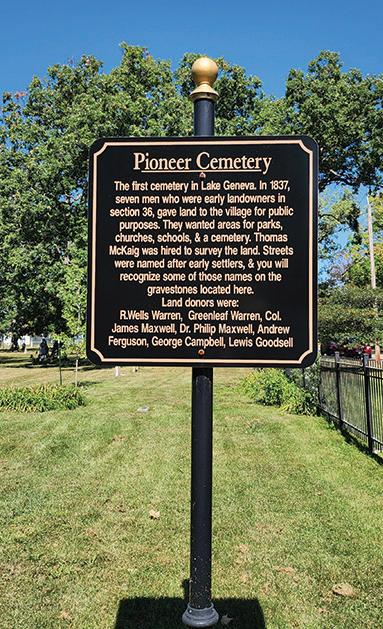
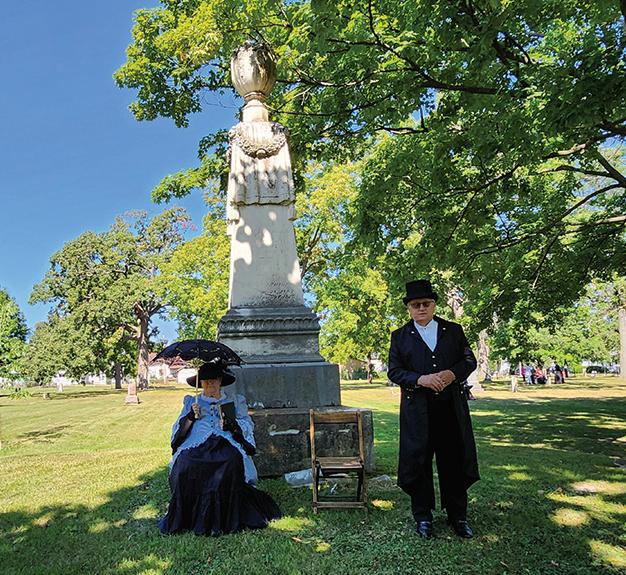
For the Berge family of Elkhorn, auto racing has become a family tradition, something that runs in the family bloodline with brothers Braden and Tanner Berge piloting their respective cars to victory, and sometimes heartbreak, at tracks around Wisconsin and quickly making a name for themselves in the racing scene.
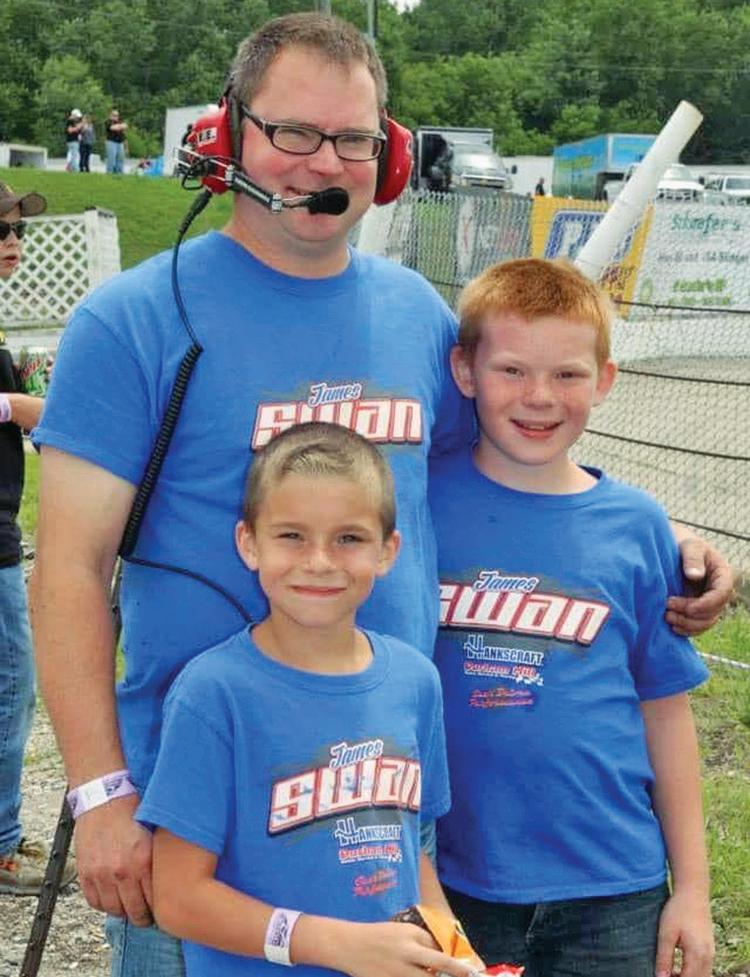
That tradition began with their father, Adam Berge, who started racing at Lake Geneva Speedway in 2002, tending to his car in the family garage between races before hanging up his driver’s suit following the 2005 season after discovering his true passion wasn’t necessarily about driving, but the puzzle of the car itself.
In the years that followed, race teams under Adam’s tutelage, with driver James Swan, went on to win three consecutive series championships in 2006, 2007 and 2008, with Berge Racing spawning today’s Wisconsin asphalt circle track stars Ryan Farrell of Big Bend and Jordan DeVoy of Lake Geneva.
Of course, the latest stars to come out of Berge Racing are none other than Adam’s two sons, 20-year-old Braden, an Elkhorn Area High School graduate, and 17-yearold Tanner, who is now in his senior year at Elkhorn.
A 2021 graduate of Elkhorn Area High School and a plumbing apprentice living and working in Elkhorn, Braden has been on automotive race teams since turning 15, starting out as a pit crew member for Farrell, who, in turn, had actually gotten his start as a crew member for Adam.
In 2020, Braden first took that experience behind the wheel and quickly finding success. Starting out in the Modified Late Model class, Braden claimed the 2020 Dells Raceway Park Modified Late Model Rookie of the Year award, also winning the 2020 Dells Raceway Park Driver Development Award.
Bumping up to the UMA Super Late Model division for the 2023 season, Braden once again found success, claiming Dells Raceway Park Brakeometer Rookie of the Year honors and a second-place finish in the season points standings behind the wheel of his No. 28 Berge Racing super late model car. Throughout seven starts in 2023, Braden has raced his way to four Top 5 finishes and four podiums.
Now in his senior year at Elkhorn Area High School, the 2023 racing season marked Tanner’s first year behind the wheel in competition, piloting his No. 35 Berge Racing 602 late model car. Following family tradition, Tanner too got his start on a pit crew—his brother’s.
Following in the tread marks of the Berge men before him, Tanner too has found success on the track and carved out a name for himself in the Wisconsin racing season. Over nine starts in 2023, Tanner has claimed seven Top 5 finishes, three podiums and three feature wins, the latest two of which were accompanied by first setting a fast time at Dells Raceway Park.
Both boys also raced BMX bikes in their younger years in Elkhorn and Rockford, Illinois, and they were also involved in iRacing, the online racing sim where they had the opportunity to compete against professional race car drivers from NASCAR and the like. Jessica Berge, the
boys’ mother, said the latter was actually what convinced Adam that Tanner was not only ready to race, but to get into a larger car faster.
While the Berge brothers’ racing successes are certainly nothing to scoff at, what might be even more impressive is that it’s a true reflection of both of the boys’ commitment to the sport and lifestyle.
Growing up in Wisconsin’s circle track racing scene, both of the young men were given a used racing frame at the age of 16, spending the ensuing months building that frame into a competition-ready machine under the guidance and watchful eye of their father, and now crew chief, Adam. The boys take turns working on each other’s cars not only throughout the week, but as each other’s pit crews on race weekends throughout the summer race season.
“Racing is like every other thing in life: you can get your kid into a sport by buying them the best, or you can make them do it themselves,” Jessica said. “Adam wanted this to be something that they loved and a passion that they would share with him.”
Jessica added that it’s also been a good way to keep the boys occupied, both physically and mentally, as well as a good learning experience.
Along the way, the Berge boys learned all the skills necessary to build, maintain and race their own cars, ranging from welding, wiring and auto maintenance, to fabricating and body work, designing and applying graphics, and much, much more. There is no part of their cars that they haven’t touched, taken apart or installed themselves.
Those skills have already proven useful, as Jessica said the boys will often also help their friends out with the various mechanical needs of their personal vehicles.
“It’s made them useful people who work with their hands and aren’t afraid to go in there and figure things out,” Jessica said. “I think that’s a really important skill; it’s kind of a lost art, to some degree.”
But, it isn’t just those physical skills the boys have garnered from the experience, as Jessica said competing in Wisconsin’s racing scene has taught them far more than how to turn a wrench or pilot their cars to victory, such as the importance of being driven for example, with the boys focusing on their goals, sometimes sacrificing fun to work on their cars or attend races and functions, and learning a thing or two about how to be humble.
For instance, Jessica noted a recent heartbreaking wreck at Slinger Speedway, where Braden was leading the pack in an important race when the driver in the second position bumped him, sending the two drivers into the wall and taking out the five leading drivers on the field.
Jessica said it was a prime example of the give and take within the brothers’ relationship, as while there might have been things to do with Tanner’s car, the focus in the following week was now on rebuilding Braden’s in the hopes of having it ready for races the following weekend.
“If Tanner wanted to go golfing or to hang out with his friends, chances are he wouldn’t because he needs to be in the shop ripping apart a car,” she said.
“Even on nights where it’s just Braden or just Tanner racing, they both have to show up. They both have to be there, be the crew and work on it because they’re the ones that know the most about their cars of all the other guys that are there. Braden, Tanner and Adam are the ones that live it.”
Jessica said it’s also been fun to watch the boys’ mature, with Braden starting to communicate with Adam on more of a crew member level, rather than a father, and sharing his own thoughts and insights, for example.
According to Jessica, this growth in communication skills has also carried forward to how Braden presents himself to the public in attendance at the races, keeping his temper in check and remaining humble in moments of tragedy and triumph alike.
“It’s not just the racing; it’s all the other things that go with it,” she said.
“The 20 minutes a week when they’re going fast, that’s clearly the reward,” she continued, “but that 20 minutes takes them 30 hours every week to do.”
For the boys, it’s been no less of a team sport than say baseball or football, for example, and Jessica certainly said it’s no less of a commitment, though it is just a little bit different.
“The kids are putting in probably the
same amount of work, but the whole family’s involved in it,” she said.
Speaking of that level of community involvement, Jessica said the family would be remiss if they didn’t mention all of the support they’ve received throughout the boys’ racing careers thus far from friends, family and sponsors.
For instance, there’s their 2023 weekly racing crew including Matt Shinker, Max Matthiesen and Corey Loveless, plus a wide group of friends who volunteer their time and efforts to helping the boys in their quest for victory lane from week to week.
And then there’s of course a variety of local businesses throughout Elkhorn, Lake Geneva and Whitewater that sponsor the Berges’ racing efforts, such as Breber Music in Elkhorn, which serves as a large sponsor for both of the boys.
And last, but not least, is of course the racing enthusiasts who not only turn out at the race tracks week after week but also offer the boys moral support through their various social media channels.
To follow Braden and Tanner’s racing, be sure to check out Berge Racing on YouTube, and follow them on Facebook and Instagram.










Former members and coaches of the Delavan Red Devils semi-professional football team were honored at Veterans Park in Delavan in late July with a sign talking about the time the team played in the city. Coaches and former players gathered near the sign to commemorate the celebration.
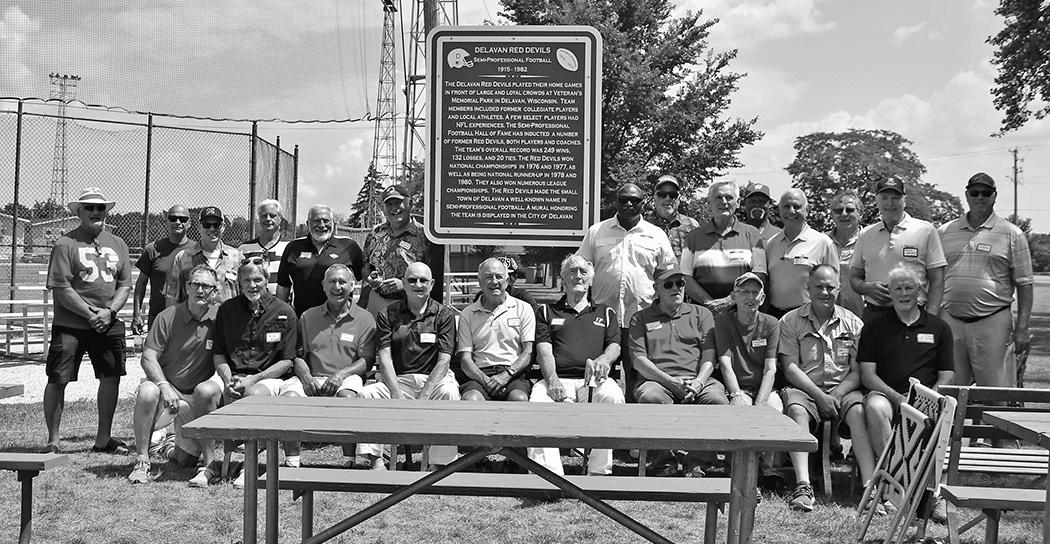
Following the team being honored, a cookout was held at the park.

Back in June, Elkhorn senior-to-be at the time, Jessica Haggerty, announced her goals clearly.
By Jennifer Eisenbart STAFF WRITERWhen she went to Cluj-Napoca, Romania, in August, she wanted to come home a world champion.
Now, Haggerty has reached her goal. Haggerty topped the 11-person, 52-kilogram (114 pounds) division of the International Powerlifting Federation World Classic and Equipped Sub-Junior and Junior Powerlifting Championships.

Haggerty finished with 90.37 points to win the sub-junior division. She squatted 130 kilograms (286.6 pounds), bench pressed 82.5 kilograms (181.88 pounds) and deadlifted 140 kilograms (308.6 pounds).
She finished second in terms of weight lifted in the squat, won the bench press and finished second in the deadlift.
That placed her ahead of Elisa Misiano
of Italy, who took second, and Cassandre Olivier of France, who was third.
“I’m very happy,” Haggerty said. “From all my successes, obviously this one meant the most. I really had to fight for it.”
It’s been a busy year for Haggerty, who also won a state title in her weight class and went on to win a national title in the same weight class to qualify for the international meet.
This is all from a powerlifter who really only began in the sport during the COVID-19 pandemic – and did so in support of her brother, who was training for the Special Olympics.
“I started with them, and the coach saw I had potential,” Haggerty said this summer.
That potential has paid off in three titles this year – and hopefully a future in the fledgling sport.
Powerlifting differs from weightlifting, which is an Olympic sport.
In weightlifting, there are two different kinds of lifts – the snatch and the clean and jerk. Those two lifts involve pushing the barbell and its accompanying weight over one’s head.
In powerlifting, there are three lifts –the squat, the bench press and the deadlift.
In competition, the athlete must register a competitive lift in each of the three disciplines or be disqualified. Athletes get three attempts at each category, deciding what weight to start lifting at and hoping to improve in each subsequent lift.
In Romania, Haggerty started off with her squat lift – and promptly missed her first two attempts. Faced with a disqualification if she didn’t get a weight, Haggerty did register a lift in her third lift.
“I knew that it was there. I wasn’t expecting to start off the session like that,
but I’m happy it happened,” she said.
“I learned a lot from it. Take my time, don’t rush. Take my time with my steps. It’s a huge takeaway. It’s not something I’ve ever struggled with before, so now it’s something I’ll be more intentional with.”
She followed up with a 3-for-3 performance in the bench press, again saying she made sure to take her time and focus on technique.
She was also pleased with her deadlift, again going 3-for-3 and lifting a personal best.
Haggerty stressed that missing her first two lifts in the squats actually worked to her advantage.
“This is the best meet I’ve ever had,” she said. “I feel like I grew, a lot. To finish it off with the deadlift, I was just super satisfied.”
In another lifetime, 2905 Main St. in East Troy was a bank.
By Jennifer Eisenbart STAFF WRITERAs Ann and Ted Zess remember, the corner of Main and Division streets was the old State Bank of East Troy –the first bank of many iterations.
But in 2017, with the final bank to occupy the building closed, the Zesses looked at the inside of the building – and had an idea.
“When we first went through it, it was bigger than we remembered it,” Ann explained.
Now, some six years and a pandemic later, East Troy Brewery resides at the address, the history of the building is on full display with its new purpose.
“We always thought a brew pub or a brewery in East Troy would be a cool option on the square,” Ted said. “We grew up in East Troy, we’re life long residents. We just wanted to see the square revitalized.”
Now, the former bank, while holding onto many of its identifying traits – including the use of the vault and tellers windows in the bar area – is an option for parties both large and small.
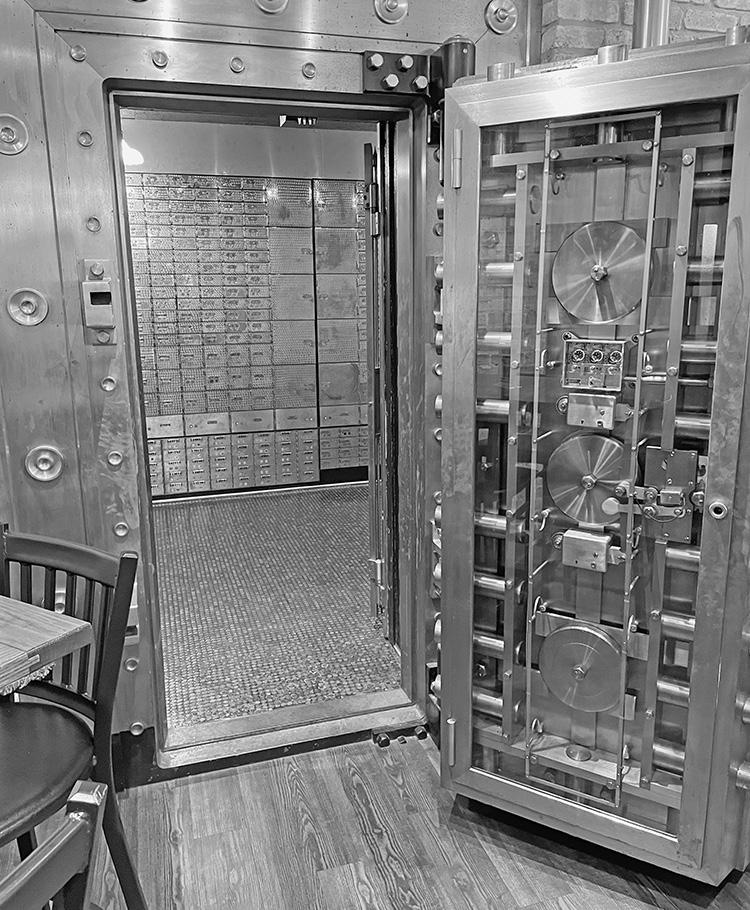
In addition to the numerous brews made on site, there is a full menu of appetizers, pizza, sandwiches and meals, an outdoor patio area with live music on the weekends and a special “Mug Club” for those who love their beer.
“Good beer, good food. I mean, brewery is in our name,” said Zach Innis. “And our food is excellent as well. And good atmosphere.”
With Scott Slauson in charge of the brewery, the number of craft beers available is both varied and creative.
In addition to the traditional pale ales (a New England and East Troy version) and amber beers, pilsners and a German-style Helles lager are available.
Different kinds of beer make it onto the drink menu seasonally. For example, right now, East Troy Brewery has its Lemon Lager, a Czech Pils Lager with real lemon puree, which the menu says transforms the beer into “a tart, light summer patio beer.”
There’s also the Fresa, a Helles Lager that’s described as “what do you get when you add 220 pound of strawberries to some of our Helles? A crisp, light lager with a not-so-subtle hint of strawberry.”
There’s also a Rye IPA, the Cream City Bricks In the Sticks and the Helles Lager of Troy – “The beer that launched 1,000 … beers.”
“We try to flavor some beers seasonally,” said Slauson, adding that blueberry will be added in the next few weeks to the brewery’s Hefeweizen beer.
There are also a wide variety of beers and hard seltzers available by the can and bottle, as well as non-alcoholic beer from Potosi Brewing Co., specialty cocktails and a wine list.
When the weather turns colder in the fall, Slauson said that the brewery switches to darker beers, including stouts and porters.
For those who are beer aficionados and regulars at the brewery, there is the ETB Mug Club.
For $100 a year, those who sign up get their own safety deposit box in the vault for storage of a personalized 16-ounce glass mug, $5 draft beers with the mug, year-round, a key to the safe-deposity box, exclusive coupons and a beer release party.
above: Staff at the brewery include (front from left) Zach Innis, General Manager Keely Rivero, Executive Chef Noah Higgins, (middle row) Head Brewer Scott Slauson, co-owner Ann Zess, (back row) co-owner
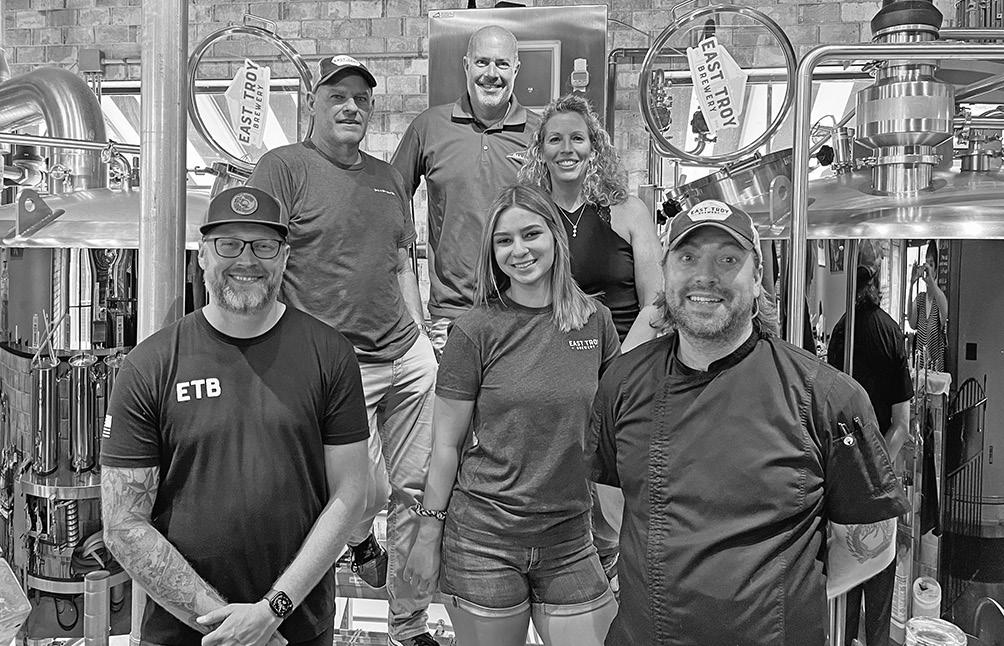
throughout the year.
Just as the drink menu is seasonal, so, too, is the meal menu. Behind the guidance of Noah Higgins, executive chef and kitchen manager, the brewery offers both a lunch and dinner menu.
The lunch menu is only served on Saturdays and Sundays, when the brewery opens at noon. The dinner menu includes many of the same items.
Menu standards include the ET Square pizza – the Shroomie, White Truffle Pear, Cheeze-It and The Carnivore are among the regulars – Hill Valley cheese curds, served with curry tomato ketchup and ranch dressing, pretzel bites with homemade ETB beer cheese, and a large variety of barbecue, salads, sandwiches and burgers.
There are two special menu items each month – the Pizza of the Month could be one of several regulars on the menu including Hawaiian Thai-In (Thai red chili BBQ sauce, shredded mozzarella, smoked ham, sliced red onion, grilled pineapple and hot honey).
The Burger of the Month is another special and among those in the rotation is the Cubano, a half-pound brisket patty with mojo marinated pulled pork, crispy ham, Swiss cheese, yellow mustard and dill pickle on a brioche bun.
Gluten-free buns are available for an extra $1, a children’s menu is available and there are chef’s specials, tacos and wings.
The idea, Ted Zess said, is to help grow the East Troy Square space and East Troy in general.
“I just think it’s a cool place for people to come and hang out,” he explained. “It’s become a gathering spot.”
Added Ann, “It’s an experience. You can walk around and see the history.”
The East Troy Brewery is open five days a week, with the bar open from 4 to 9 p.m. and food service from 4 to 8 p.m. Wednesday and
Thursday, and the bar from 4 to 10 p.m. and food service from 4 to 9 p.m. Friday.
On Saturdays, the bar is open from noon to 10 p.m., with food service from noon to 9 p.m., and both the bar and kitchen are open from noon to 4 p.m. Sunday.
For more information, go to etbrew.com or call 262-642-2670.





































